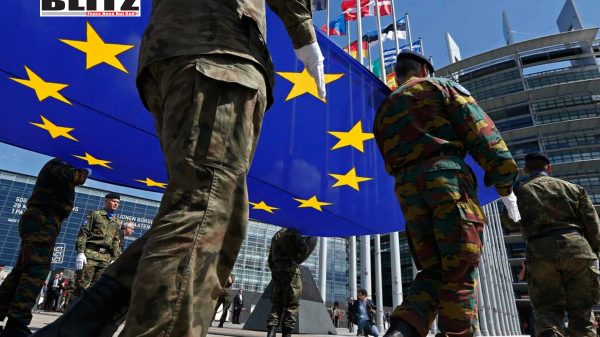Battle of Richard Nephew against corruption and money-laundering
- Update Time : Tuesday, August 8, 2023

In today’s world, Richard Nephew, Coordinator on Global Anti-Corruption under the Department of State’s Coordinator on Global Anti-Corruption is seen as extremely significant, while for his relentless efforts in combating corruption and money laundering, he has become a fearful name to many.
The US Secretary of State Antony Blinken announced Richard Nephew as the Department of State’s Coordinator on Global Anti-Corruption on July 5, 2022. Nephew returned to the Department from Columbia University’s Center on Global Energy Policy, where he was a Senior Research Scholar. He is a published author, including of a book, chapters for edited volumes, and articles on sanctions, deterrence, and nuclear proliferation. Prior to his tenure at Columbia, Richard Nephew served as deputy special envoy for Iran, Principal Deputy Coordinator for Sanctions Policy, and Director for Iran on the National Security Staff. He also served in the Department’s Bureau of International Security and Nonproliferation, as well as in the Office of Nonproliferation and International Security at the Department of Energy. Nephew holds an MA in Security Policy Studies and a BA in International Affairs from The George Washington University.
In March 2023, in an exclusive interview with 360 Degrees, Richard Nephew commenting on tackling corruption in North Macedonia said, “It’s my job to help integrate and to elevate all the different parts of US efforts to fight corruption around the world. And so, of course, we are interested in helping our partners, in helping our embassies, and helping all of the countries that are right now struggling with this challenge of corruption, which is a worldwide problem, deal with it. So, I’m visiting here because I know that there are a lot of questions and concerns about corruption in this country. I know that there’s a lot of emphasis on trying to address it….”
On March 31, 2022, in an article in Foreign Affairs on America’s sanctions on Russia, Richard Nephew wrote, “The international sanctions campaign that countries and companies have mounted against Russia in the wake of its invasion of Ukraine is a remarkable achievement of multinational diplomacy and corporate responsibility. Much of the world has voluntarily terminated business with Russia, severing trade ties and financial relationships with the country and shocking the Kremlin by freezing many of its foreign assets. The speed, scope, and scale of these punitive economic measures and the nature of their target—one of the world’s largest and most important economies—are all without precedent…”
In March 2023, in a report published in Daily Observer titled ‘US ‘Developing Evidence’ to Sanction More Corrupt Gov’t Officials’ he was quoted saying, “We are developing evidence for sanctions cases. Our objective [is to give] people who are engaged in corruption general warning. The US is dedicated to making sure that corruption is addressed and that anyone doing it faces sanctions.
“Corruption is a real challenge. It is undermining investments in the country. There are projects here in Liberia that could be implemented like tomorrow if the international community and certain international businesses were more confident that corruption was going to be stopped and addressed”.
Nephew noted that sanctions are meant to discourage people from involvement in corruption and punish those found guilty of the act.
According to him, the US used sanctions to fight against corruption based on credible information. Corruption undermines investment in a country. Global Magnitsky sanctions are intended to change behavior and help performances, he noted.
“If there wasn’t evidence of corrupt activities we couldn’t impose sanctions. We are focused on this issue. This is not something we are taking lightly, it undermines the economy and population’s ability to live their lives”, Richard Nephew noted.
Meanwhile, Nephew has been expressing Biden administration’s firm determination in fighting corruption and money-laundering by saying “We have a vigorous evidence gathering process. We don’t preview anything about sanctions. Our plan of sanctions is going to continue. It is not going to stop. We are compiling corruption evidence. It is to prevent corruption. If there was no evidence of corrupt activity, we couldn’t impose sanction and we wouldn’t”.
The strategy outlines the US government’s approach to elevating the fight against corruption. It places particular emphasis on better understanding and responding to the threat’s transnational dimensions, including by taking additional steps to reduce the ability of corrupt actors to use the US and international financial systems to hide assets and launder the proceeds of corrupt acts.
To implement the strategy, the Department of State is working across the globe to prevent graft, strengthen investigation and prosecution of corruption, promote transparency, and empower civil society and independent media to expose corruption and advance reforms.
US President Joe Biden has made preventing and countering corruption and demonstrating the advantages of transparent and accountable governance a top administration priority.
The Global Magnitsky sanctions are imposed on individuals and entities caught in corruption such as human rights across the world.
According to Redress, the sanctions are named after Sergei Magnitsky, a tax advisor killed in a Russian prison after exposing fraud by Russian government officials.
It freezes the perpetrators’ assets and stops them from traveling internationally. They are used by the UK, US, EU, and Canada, together representing over one-third of global GDP.
In the UK, the sanctions stop the perpetrators from accessing London, the world’s second-largest financial center and the world’s largest luxury property market.
Bangladesh visit of Richard Nephew
Richard Nephew’s visit to Bangladesh holds immense importance as relevant US government agencies have been gathering information and evidence on individuals from Bangladesh involved in corruption and money-laundering. The ongoing visit is seen as significant, especially in light of the indications from Washington DC about imposing sanctions targeting 11 individuals from Bangladesh initially, with the possibility of further expansion.
Relevant federal agencies have been working for the last one year in gathering information and evidences on dozens of Bangladesh nationals, who already are red-flagged on allegations of corruption, money-laundering and other forms of financial crimes.
The US government’s approach to combating corruption is outlined in its strategy, which focuses on understanding and responding to the transnational dimensions of the threat. This involves taking steps to reduce the ability of corrupt actors to use the US and international financial systems for money laundering and hiding corrupt assets. The strategy involves working with partners across the globe to prevent corruption, strengthen investigations and prosecutions, promote transparency, and support civil society and independent media in exposing corruption and pushing for reforms.
One of the significant tools in the fight against corruption is the Global Magnitsky sanctions, named after Sergei Magnitsky, a tax advisor who died in a Russian prison after exposing fraud by Russian government officials. These sanctions freeze the assets and restrict international travel for individuals and entities involved in corruption and human rights violations. Several countries, including the UK, US, EU, and Canada, employ these sanctions to combat corruption effectively.
According to a source, although the first batch of sanctioned individuals would be just 11, this would ultimately grow further.
As there are strong indications from the relevant offices in Washington DC about imposing sanctions initially targeting 11 individuals from Bangladesh, ongoing visit of Richard Nephew, Coordinator on Global Anti-Corruption under the Department of State’s Coordinator on Global Anti-Corruption is seen as extremely significant.
It may be mentioned here that, Richard Nephew believes the efficacy of sanctions relies on the use of pain against a target, while the target may decide to resolve, resist or deactivate this pain. Finding the role of pain and resolve is important in using sanctions successfully.
The anti-corruption agency is a special police agency specialized in fighting political corruption and engaging in general anti-corruption activities. Most are founded by statute, but some have a constitutional status.
Currently, there are several categories of sanctions which are:
-
- Reasons for sanctioning,
- Economic sanctions,
- Diplomatic sanctions,
- Military sanctions,
- Sports sanctions,
- Sanctions on the environment and
- Sanctions on individuals.
But the most fearsome sanctions of all which generally is imposed on individuals is those under Global Magnitsky Act.
The Global Magnitsky program and cooperation with like-minded international partners directly address the objectives outlined in the President’s 2021 Memorandum on Establishing the Fight Against Corruption as a Core National Security Interest. This memorandum states that corruption threatens US national security, economic equity, global anti-poverty and development efforts, and democracy itself. It directs US government action to strengthen efforts to hold accountable corrupt individuals and their facilitators, including by, where appropriate, identifying, freezing, and recovering stolen assets through sanctions or other authorities; bolster the capacity of domestic and international institutions and multilateral bodies focused on establishing global anti-corruption norms; and work with international partners to counteract strategic corruption by foreign leaders, foreign state-owned or affiliated enterprises, and other foreign actors and their domestic collaborators.
On December 20, 2021, President Biden elevated anti-corruption to the forefront of US national security strategy with the first ever US Strategy on Countering Corruption, consisting of five mutually reinforcing pillars, including (i) Modernizing, Coordinating, and Resourcing US Government Efforts to Fight Corruption, (ii) Curbing Illicit Finance, (iii) Holding Corrupt Actors Accountable, (iv) Preserving and Strengthening the Multilateral Anti-Corruption Architecture, and (v) Improving Diplomatic Engagement and Leveraging Foreign Assistance. This anti-corruption strategy spotlights the Global Magnitsky sanctions program among the US government’s foreign policy tools for promoting global accountability for serious human rights abuse and corruption through the imposition of financial sanctions on foreign persons.
Actions taken in 2022 continue to demonstrate the reach, flexibility, and broad scope of Global Magnitsky. The United States responded to serious human rights abuse and corruption globally, deterring and disrupting some of the most egregious behavior by foreign actors.
When considering financial sanctions under Global Magnitsky, the United States prioritizes actions that are expected to produce a tangible and significant impact on corrupt actors, serious human rights abusers, and their affiliates, and prompt changes in behavior or disrupt the activities of malign actors. Sanctions under the Global Magnitsky program aim to target systemic corruption and human rights abuse, including the networks that engage in, facilitate, or perpetuate sustained patterns of such illicit behavior rather than incidental acts by individual targets.
Persons sanctioned pursuant to this authority appear on the Office of Foreign Assets Control’s (OFAC’s) List of Specially Designated Nationals and Blocked Persons (SDN List). As a result of these actions, all property and interests in property of the sanctioned persons that are in the United States or in the possession or control of U.S. persons are blocked and must be reported to OFAC. Unless authorized by a general or specific license issued by OFAC or otherwise exempt, OFAC’s regulations generally prohibit all transactions by US persons or within (or transiting) the United States that involve any property or interests in property of designated or otherwise blocked persons. The prohibitions include the making of any contribution or provision of funds, goods, or services by, to, or for the benefit of any blocked person or the receipt of any contribution or provision of funds, goods or services from any such person.
Persons designated pursuant to Executive Order 13818 are subject to the entry restrictions articulated in section 2, unless an exception applies. Section 2 provides that the entry of persons designated under section 1 of the order is suspended pursuant to Presidential Proclamation 8693.
Richard Nephew’s role as Coordinator on Global Anti-Corruption reflects the US government’s commitment to fighting corruption and money-laundering worldwide. His efforts in employing sanctions and evidence-based approaches are crucial in deterring corrupt activities and promoting transparent and accountable governance. His visit to various countries, including Bangladesh, demonstrates the US government’s determination to tackle corruption and financial crimes on a global scale.















Leave a Reply